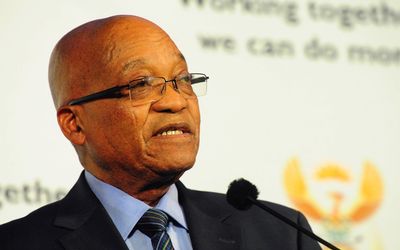A call for change puts SA’s stability in the dock
by George Devenish,
2014-01-29 05:26:17.0
DURING a recent election campaign in Mpumalanga, President Jacob Zuma called on his supporters to give him a "huge majority" so he would be able to amend the constitution to remove "certain hurdles". Opposition politicians demanded to know in detail what provisions would be changed. Such proposed changes should be clearly spelt out before the election so that the electorate can make an informed judgment on the issue.
South Africa has a rigid constitution in legal and constitutional terms, as special procedures, set out in section 74, are required for amendment. Amendments can be classified in five categories, explained below.
• Section 1, which defines the seminal values, such as human dignity and equality, on which the constitution is premised, and section 74(1) of the constitution, the entrenching provision, may be amended only by a bill passed by the National Assembly with the supporting vote of at least 75% of its members with the support of at least six of the provinces in the National Council of Provinces (NCOP);
• Chapter 2 of the constitution, which embodies the Bill of Rights, may be amended only by a bill passed by the National Assembly supported by a vote of at least two-thirds of its members together with the support of at least six of the provinces in the NCOP;
• Any other provision of the constitution may be amended by a bill passed by the National Assembly, supported by a vote of at least two-thirds of its members, with the support of at least six of the provinces in the NCOP, provided that the amendment relates to a matter that affects the NCOP; alters provincial boundaries, powers, functions or institutions; or amends a provision that deals specifically with a provincial matter;
• In an instance where a bill affects a specific province, it may not be adopted by the NCOP unless it has been approved by the relevant provincial legislature. This is an example of ratification by an institution that does not form part of the legislative process, and it is intended to protect the interest of the province concerned; and
• All other provisions of the constitution may be amended merely by a two-thirds majority in the National Assembly.
There is, however, another potential obstacle to changing the constitution. It is known as the "basic structure doctrine", which the Supreme Court of India has pioneered. According to this doctrine, India’s constitution has been interpreted to impose certain substantive limitations on the power of the legislature to amend the constitution at all, despite the fact that article 368 of the constitution appears to confer an unlimited power of amendment on the legislature, by virtue of the mechanism of a two-thirds majority.
According to this doctrine, the question is asked whether a process of radical restructuring of the constitution might not qualify as an "amendment" at all. In its seminal judgment in the case of Kesavananda versus the State of Kerala, the Indian Supreme Court held that the amending power conferred by article 368 did not extend to any amendment that would alter the basic structure of the constitution, such as, for example, the independence of the judiciary.
The doctrine is a controversial one and there are cogent arguments for and against it. As far as South African constitutional law is concerned, in the case of the premier of KwaZulu-Natal versus the president of South Africa, the Constitutional Court left open the possibility that it would incorporate this doctrine into our law. In this case, Judge Ismail Mahomed merely observed that this profound and indeed potentially revolutionary doctrine has indeed engaged the Indian Supreme Court for some years. As a result of this and other South African cases, the exact status of the doctrine remains unclear in South Africa, as the court did not actually hold that it applies in our constitutional law. It has been submitted however that, should Parliament, using a legislative act, patently violate our democratic dispensation, and thereby undermine the fundamental principles on which the constitution is premised, then the exercise of the doctrine be justified.
Any substantive change, as opposed to a mere technical change to the constitution, is a complex issue, potentially destabilising and fraught with political and constitutional difficulties, and is therefore unlikely to be proposed. Nevertheless, Zuma’s statements are most unfortunate as, in the interest of the country, clarity on this issue is essential for both political and economic stability.
• Devenish is professor emeritus and senior research associate at the University of KwaZulu-Natal.

President Jacob Zuma. Picture: GCIS
DURING a recent election campaign in Mpumalanga, President Jacob Zuma called on his supporters to give him a "huge majority" so he would be able to amend the constitution to remove "certain hurdles". Opposition politicians demanded to know in detail what provisions would be changed. Such proposed changes should be clearly spelt out before the election so that the electorate can make an informed judgment on the issue.
South Africa has a rigid constitution in legal and constitutional terms, as special procedures, set out in section 74, are required for amendment. Amendments can be classified in five categories, explained below.
• Section 1, which defines the seminal values, such as human dignity and equality, on which the constitution is premised, and section 74(1) of the constitution, the entrenching provision, may be amended only by a bill passed by the National Assembly with the supporting vote of at least 75% of its members with the support of at least six of the provinces in the National Council of Provinces (NCOP);
• Chapter 2 of the constitution, which embodies the Bill of Rights, may be amended only by a bill passed by the National Assembly supported by a vote of at least two-thirds of its members together with the support of at least six of the provinces in the NCOP;
• Any other provision of the constitution may be amended by a bill passed by the National Assembly, supported by a vote of at least two-thirds of its members, with the support of at least six of the provinces in the NCOP, provided that the amendment relates to a matter that affects the NCOP; alters provincial boundaries, powers, functions or institutions; or amends a provision that deals specifically with a provincial matter;
• In an instance where a bill affects a specific province, it may not be adopted by the NCOP unless it has been approved by the relevant provincial legislature. This is an example of ratification by an institution that does not form part of the legislative process, and it is intended to protect the interest of the province concerned; and
• All other provisions of the constitution may be amended merely by a two-thirds majority in the National Assembly.
There is, however, another potential obstacle to changing the constitution. It is known as the "basic structure doctrine", which the Supreme Court of India has pioneered. According to this doctrine, India’s constitution has been interpreted to impose certain substantive limitations on the power of the legislature to amend the constitution at all, despite the fact that article 368 of the constitution appears to confer an unlimited power of amendment on the legislature, by virtue of the mechanism of a two-thirds majority.
According to this doctrine, the question is asked whether a process of radical restructuring of the constitution might not qualify as an "amendment" at all. In its seminal judgment in the case of Kesavananda versus the State of Kerala, the Indian Supreme Court held that the amending power conferred by article 368 did not extend to any amendment that would alter the basic structure of the constitution, such as, for example, the independence of the judiciary.
The doctrine is a controversial one and there are cogent arguments for and against it. As far as South African constitutional law is concerned, in the case of the premier of KwaZulu-Natal versus the president of South Africa, the Constitutional Court left open the possibility that it would incorporate this doctrine into our law. In this case, Judge Ismail Mahomed merely observed that this profound and indeed potentially revolutionary doctrine has indeed engaged the Indian Supreme Court for some years. As a result of this and other South African cases, the exact status of the doctrine remains unclear in South Africa, as the court did not actually hold that it applies in our constitutional law. It has been submitted however that, should Parliament, using a legislative act, patently violate our democratic dispensation, and thereby undermine the fundamental principles on which the constitution is premised, then the exercise of the doctrine be justified.
Any substantive change, as opposed to a mere technical change to the constitution, is a complex issue, potentially destabilising and fraught with political and constitutional difficulties, and is therefore unlikely to be proposed. Nevertheless, Zuma’s statements are most unfortunate as, in the interest of the country, clarity on this issue is essential for both political and economic stability.
• Devenish is professor emeritus and senior research associate at the University of KwaZulu-Natal.




























Post a comment